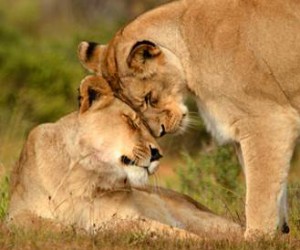With 70% of lions in SA being bred for hunting and the illegal trade in lion products escalating year on year, is it possible that Africa's most iconic symbol is becoming – like the rhinoceros – worth more money dead than a alive?
The One&Only Cape Town is to host a charity auction dinner in conjunction with the Forever Wild Lion programme of the Wilderness Foundation on September 18th. This follows a highly successful gala event at the luxury resort in the Victoria and Alfred Waterfront last year that netted the Foundation’s rhino protection campaign nearly R300 000.00. With the monies raised, an anti-poaching vehicle was purchased and since it has been in use in a Mpumalanga reserve, there have been no incidents of rhino poaching there – a remarkable testament to its efficacy in this conservation battle.
The annual One&Only Cape Town gala charity auction on behalf of the Wilderness Foundation will take place once again in the resort’s glamorous Ballroom and South Africa’s master chef Reuben Riffel will present a three-course menu with wines sponsored by Kleine Zalze of Stellenbosch. Star auctioneer Ariella Kuper will encourage guests to bid generously for stellar items including a work by renowned British royal portrait painter Richard Stone, a bespoke Nobu cocktail party for 20 people at the successful contributor’s home, the ultimate Spa experience by ESPA and artisanal appliances by KitchenAid South Africa.
Respected local and international conservation organisations, among them the Endangered Wildlife Trust, warn that rapidly dwindling numbers of rhino (in Africa) and tiger (in Asia) are prompting trans-national poaching syndicates to switch their attention to other species in their “traditional medicine” rackets. Their efforts have succeeded in promoting the efficacy of products such as lion bones for “curing” afflictions such as male sexual potency to such an extent that some hunting farms in South Africa are disinterring lion carcasses several years after the animals have been killed in order to “harvest” the remains.
According to the Kelly Marnewick of the Endangered Wildlife Trust’s Carnivore Conservation Programme, the lion-bone trade in South Africa was rapidly becoming a serious concern, with traders offering hunting-farm owners upwards of R30 000 per skeleton.
Existing trade, she maintains, will probably stimulate demand for lion bones which – in turn – will have implications for “wild” as well as captive lion populations.
“Lion numbers in Africa have decreased from nearly 200 000 a century ago to fewer than 30 000 living in the wild today,” says Dr Andrew Muir, director of the Wilderness Foundation. “Of those that can be found in South Africa, only about 2 000 can be described as ‘free-ranging’.”
“Free-ranging” means the lions are able to roam almost without restriction. In South Africa, that means within the Kruger National and Kgalagadi Transfrontier parks. “Increased habitat loss and the failure to combat the growing but rapidly increasing trade in lion bones could see this drop even ruther. If current trends continue, it is expected that half of the unfenced lion population might decline to near extinction over the next 20 to 40 years,” says Muir.
Tickets to the event are limited and are priced at R750 per person. All proceeds will be donated to the Wilderness Foundation’s Forever Wild Lion Programme. To book for the One&Only Cape Town’s black tie event, call 021 431 4511/5888.
The Endangered Wildlife Trust and other conservation sources






